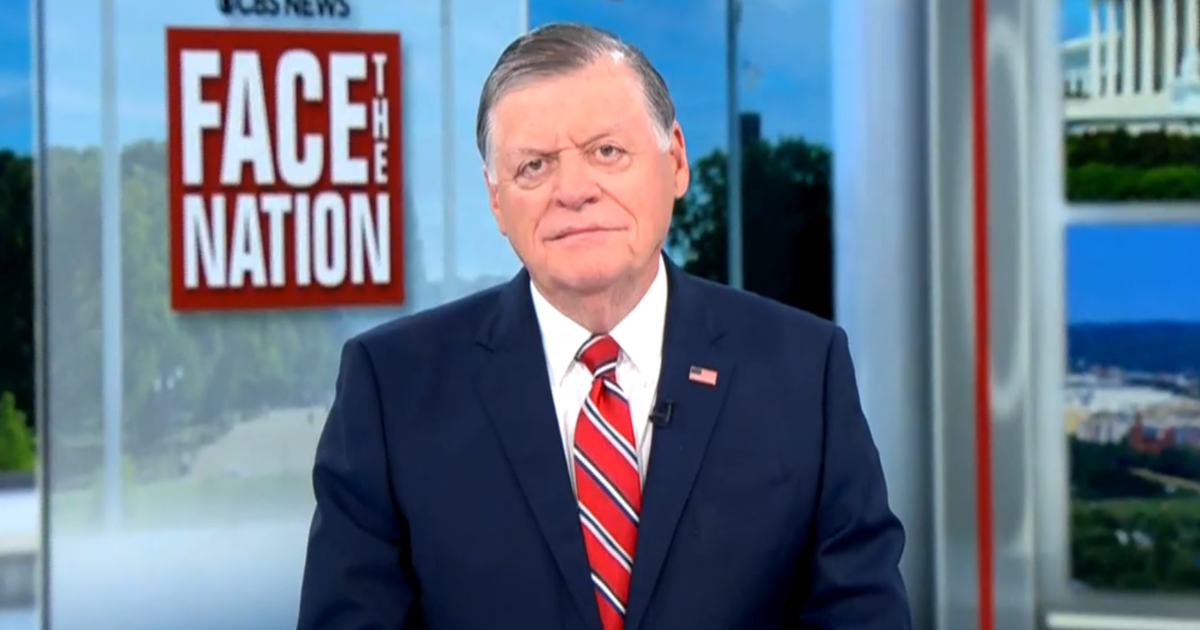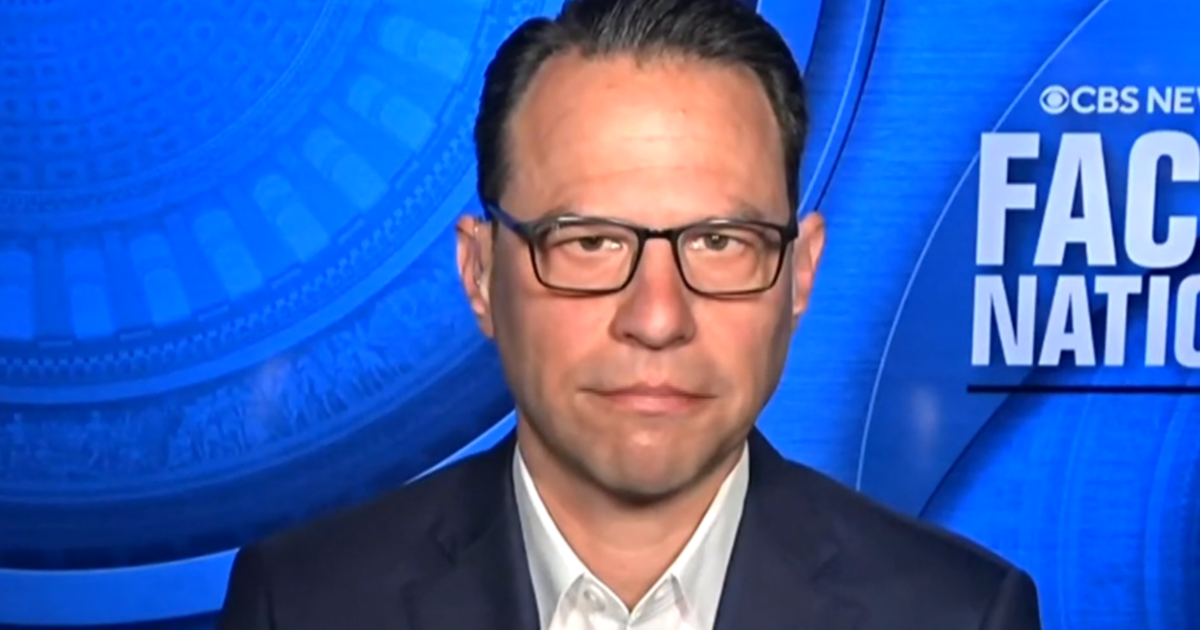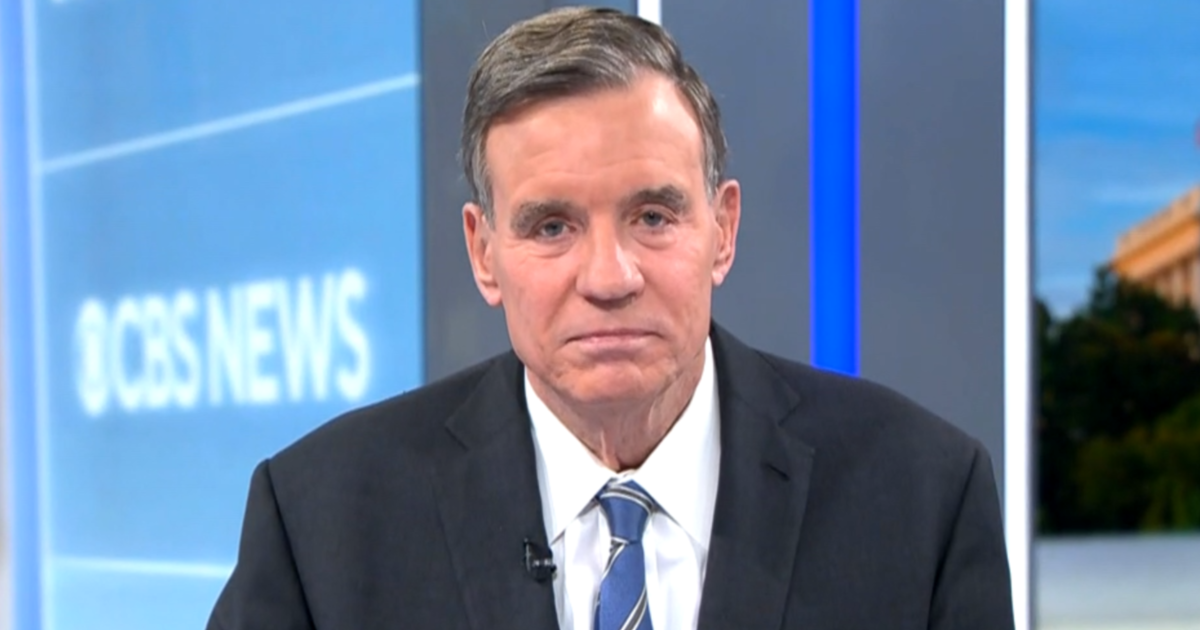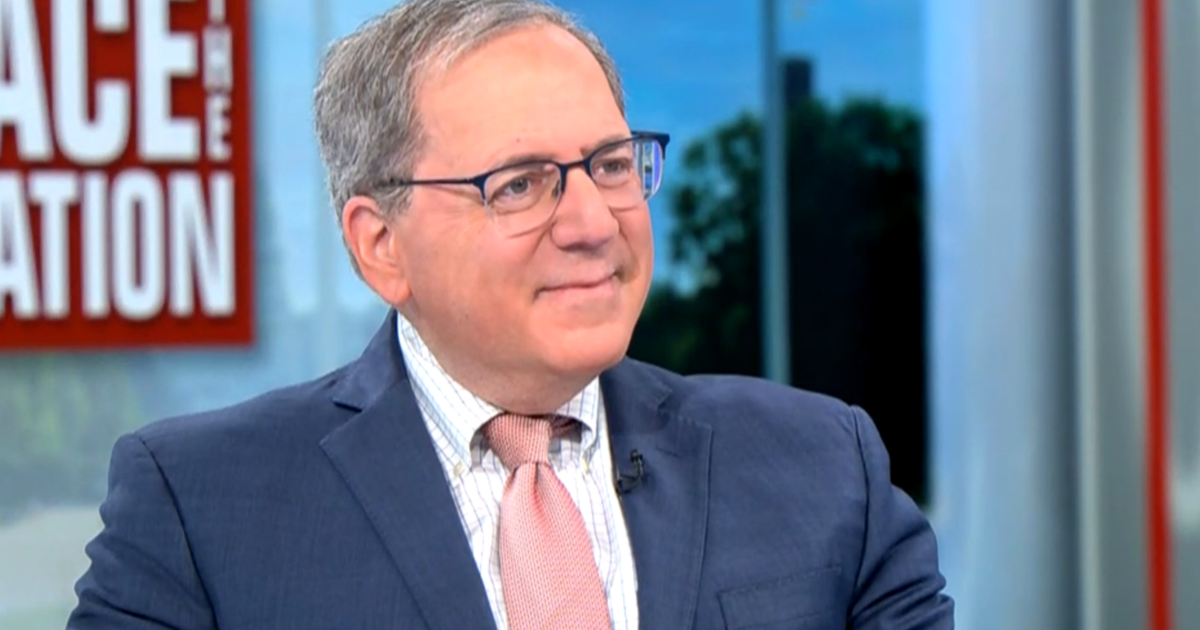Transcript: Chris Coons and James Lankford on "Face the Nation," December 29, 2019
The following is a transcript of an interview with Senators Chris Coons and James Lankford that aired Sunday, December 29, 2019, on "Face the Nation."
MARGARET BRENNAN: Good morning and welcome to Face the Nation. The holidays are filled with tradition and one sixty year Senate tradition that's largely gone unnoticed is its weekly prayer group. Every Wednesday morning, a group of bipartisan Senators to take time to pray, sing hymns, get to know each other and reflect on their common bond. We sat down with two members of the group, Oklahoma Republican James Lankford and Delaware Democrat Chris Coons. They have very different politics, but agree their prayer meetings are a valuable - and increasingly rare - opportunity for bridge-building.
MARGARET BRENNAN: You know, for most people, they sit down at the table at holidays, and the two things they're supposed to be forbidden are talking politics and talking religion. And here in this place of contentiousness--
SENATOR CHRIS COONS: We've managed to bring those together on a Wednesday morning.
MARGARET BRENNAN: You're bringing them together in a positive way?
SEN. COONS: Yes, right. We try.
MARGARET BRENNAN: In this political climate, has it hurt attendance or has it driven up attendance?
(00:01:14)
SEN. COONS: I think it's driven up attendance, frankly. We have a fluid group that includes a fairly broad range of both caucuses
SEN. LANKFORD: It's a moment for people to be able to talk about their faith, something that's deeply personal and everyone's journey. But it's also very important you- you don't really understand who someone is until reach the point, you can really learn about their faith and their own personal journey with faith.
MARGARET BRENNAN: So your faith and sort of your moral foundation has always been part of your consciousness in- in forming your political beliefs, is that right?
SEN. COONS: One of the challenges I think of our service in our time here is to strengthen and sustain our faith, even at a time when the political conclusions that people reach from that faith can lead us to have such sharply different views on the role of government, society, on the role of individual liberty and what sorts of rights we think are most central. One of the great things about having a weekly prayer breakfast is we are not getting together to argue about the issues that are so often used to divide people based on faith. We're not sitting there arguing about gay marriage and abortion and the death penalty. We're frankly sitting there praying within for each other, singing hymns, talking about our families, and then sharing some stories. We're in a very sharply divided partisan moment. It is hard to find any space here to be vulnerable, to admit that we don't have all the answers, to admit any sort of lack of certainty or confidence in our party's political views and having a conversation that starts around the most basic questions why are we here? What is it we're trying to do? Having a conversation about those very basic questions rather than a fight about the end point- the application through law- is a good way to have a conversation in a place where we so rarely do that.
SEN. LANKFORD: Faith is exceptionally important to people that live their faith. And- and what I challenge people is if you're a person of faith, live your faith, whether you're elected in politics, whether you're at work, whether you're at home, whatever, it may be, you can live your faith. Faith should impact who you are. If- if your faith only affects your weekends, that's not a faith, that's a hobby. A hobby is something you do on weekends. A faith is something that permeates everything you do. And so when I was elected, when Chris was elected, we weren't elected and said, OK, now go there, now you have to take your faith off when you go. It's still who you are and a part of who I am. Our faith and my faith in particular has the strong belief that people are creating the image of God. They have value and worth. That means people that I disagree with, I should be able to disagree with them in a way that still respects them as a person. That changes the way that I debate, that changes the way that I engage on issues because of my own personal faith.
MARGARET BRENNAN: Has partisanship become ideological? I mean, people associate political parties right now with a fundamental moral judgment of whether you're good or bad person.
SEN. LANKFORD: And that's a bad place to be. We- we- we should not identify political parties based on a particular faith or a particular faith tradition, because a political party is not about a faith.
SEN. COONS: And I think one of our challenges as people who did study faith and did practice it in our life before being elected is to strike that balance where we are elected officials and thus represent big states with a wide and robust range of people of different views. Either people have one of the main Abrahamic faiths, Muslims or Jews or Christians or people who have no faith tradition at all, but are still entitled to be adequately and well and thoroughly represented. We have to balance being part of that broad, wide open society with our own personal faith.
MARGARET BRENNAN: There are going to be people at home are rolling their eyes saying--
SEN. COONS: They are welcome to.
MARGARET BRENNAN: --this is called the swamp for a reason.
SEN. LANKFORD: Right.
MARGARET BRENNAN: And that there is no moral high ground left here. You're about to enter an even more contentious period of a time.
SEN. COONS: It is genuinely straining some of the friendships I've worked hard to build over the last decade across the aisle to be in a time when we have such sharply divided politics. I've got a number of friends who I work really well with. But on certain issues and on certain topics, we- we just- we can barely speak about it anymore. That just reflects what's happening in our home states, frankly, in some of our families. What we really need to do here in Washington, I think, is model the ability to disagree with each other, but not be cruel or sharp or nasty to each other. The whole reason we have a Congress is to resolve disputes without resorting to violence so that people who come from very different states and from very different frameworks and very different values can come together here and resolve things. We are under performing in that area right now in the Congress. We are reflecting the deep divisions that exist in our country. But I think a part of why we come here and at least a part of why I gather with my colleagues across the aisle one hour a week is to try and be open to working across the aisle, because I don't know how else we fix this. I don't know how else we're going to move forward other than respecting each other and getting to know each other across these deep and significant divisions.
SEN. LANKFORD: What- what Washington, D.C. really is a mirror to the rest of the country. Sometimes the country doesn't want to admit it. One of the key things that we can do is just be who we are. There are people of faith scattered all around the country. There are people that- that don't have a faith all around the country. But we can show respect to each other and to say, go, go live your faith. Whatever that faith chooses to be, I'm going to live mine and we're going to find a way to be able to work together, even in areas where we disagree and find there is a common ground. I don't have to compromise my values to find areas of common ground.
MARGARET BRENNAN: We're on the verge of this impeachment trial. And during the- the Clinton impeachment, we often heard from Republicans that criticism and the call for an American president to be a moral leader. And we heard about moral failings. These days you will quietly hear criticism of the president from Republicans, but you don't hear that loud criticism in the way we did 20 years ago. What has changed?
SEN. LANKFORD: Yeah. There- I'm not sure anything has changed. I think there is still this ongoing conversation about policy and about responsible leadership and about role models. I- I said very early on in the campaign time period when people asked me in 2016, what are you looking for? I said well, I always look for a president who can be a role model. I don't think that President Trump as a person is a role model for a lot of different youth, that's just me personally. I don't like the way that he tweets, some of the things that he says, his word choices at times are not my word choices. He comes across with more New York City swagger than I do from the Midwest and definitely not the way that I'm raising my kids. Saying that, there are policy areas that we agree on and when we agree on those things we work on those things together. But it's also been a grand challenge to be able to say, for a person of faith, for a person who believes that there is a right way to go on things I- I wish that he did. And he was more of a role model in those areas. Now, saying all that, on the area of life where I'm very passionate about, on the issues of abortion, for instance. He's been tenaciously pro-life. He's focused on putting people around him that are very focused on religious liberty, not honoring a particular faith, but honoring any person of any faith to go be able to live and practice that faith and to have respect for that. That's helpful for any person of faith. And to be able to say, give me the space to be able to live my faith and to be able to put people into the administration that will also allow that and encourage that. So for people of faith, it's a bit of a conundrum at times that I look at some of the moral decisions that he's made and go, I disagree with that. But he's also been very, very protective of areas like life and very protective of areas of religious liberty to be able to allow people to be able to live their faith out. And at the end of the day, what we're really looking for in an administration is folks that allow us to be able to live our principles.
MARGARET BRENNAN: Has that been hard for you as a person who talks about living his faith? Is it hard for you at times?
SEN. LANKFORD: It- it- it is not hard for me to be able to live that out because my first responsibility is for myself and for my family and we're going to live that out--
MARGARET BRENNAN: But then you get asked by people like me--
SEN. LANKFORD: That's correct.
MARGARET BRENNAN: --how could you support this?
SEN. LANKFORD: So you--
MARGARET BRENNAN: How could you support that?
SEN. LANKFORD: It- it is the most interesting question that I get almost every day when I walk through anywhere in the Capitol, someone from the press will say, the president just tweeted out this. What do you think about it? And put it- put a microphone in my face and say, answer for any kind of moral statement or he just said a curse word in a public setting. I know you're a person of faith. Go answer for this. Again, the president has a spokesperson, and I'm not the president's spokesperson. I have a responsibility for myself and my team and for what my family's going to do. And then I'm also going to try to set what I believe is the right role model. Everyone has a task here. And one of the interesting things about Washington, D.C. is I don't get to pick the people that I work with. The American people pick the people that I work with. And then my responsibility is to be able to get things done in that environment that I think drive home a set of values and a set of policies that help the nation long term.
MARGARET BRENNAN: Senator Coons I read that both you and the president are Presbyterian and have found some commonality there, but that you had kind of an awkward interaction with him once where he- he personally challenged you on the Democratic Party's support for abortion rights.
SEN. COONS: We- we've had a number of--
MARGARET BRENNAN: What was that like?
SEN. COONS: We've had a number of sharp exchanges. And, you know, the- the president's been a real challenge for me to find ways to work with. I'll tell you that praying for the president is probably one of the greatest spiritual challenges I've had to work through in my life. I- I was raised to pray for those in positions of authority, the senators and governors and congressmen and president. And President Trump and I have very different views about some core issues. We've had a conversation about his treatment of refugees and his blocking folks from coming to our country and the so-called Muslim ban that he enacted right when he was elected. And we've also had a conversation about abortion and reproductive rights. And I think we vigorously, vigorously disagree on both. What we haven't had is the time to really have a thoughtful conversation. One of the things I respect about James is when we were both invited to go to the White House, was this a year ago now?
SEN. LANKFORD: It was a year ago.
SEN. COONS: And I frankly said, I- I'm not sure I see the point. He encouraged me to be hopeful and to keep an open heart and to believe in the possibility of a positive and meaningful conversation. So far, I haven't made as much progress in that direction as I- as I might have hoped. But part of the point of being a person who believes in the potential of everybody to change and to grow is that I live in a very challenging time in a challenging environment. And I hope that I can be a good model of what it means to believe deeply in certain principles and yet respect others, others who are my colleagues, who believe equally deeply in an opposite application of that same principle.
MARGARET BRENNAN: We wish you both luck.
SEN. LANKFORD: Thank you.
SEN. COONS: Thank you.
MARGARET BRENNAN: Thank you for your time.



